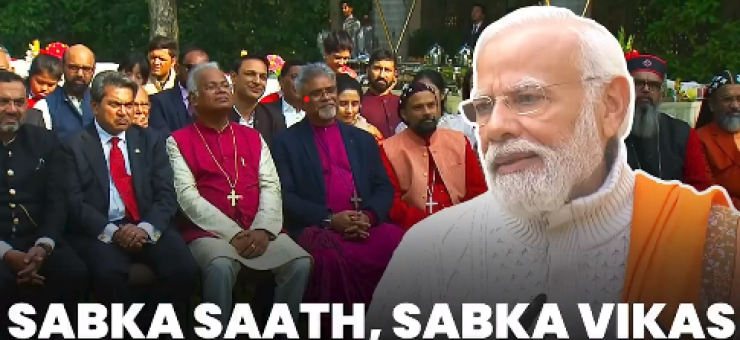
This past week, Prime Minister Narendra Modi conveyed a speech filled with warm words of appreciation for Christian leaders across India as he sent out his Christmas greetings from a gathering he held for these leaders at his home.
He mentioned that the teachings of Jesus Christ remain integral to promoting progress in India. Acknowledging that Christian leaders played a crucial role in promoting the freedom movement against the British Raj, he conveyed appreciation for the contribution of Christians in the fields of healthcare and education.
While religious minorities have largely seen Modi’s reign as a challenge to their sense of identity and belonging, Modi’s words at this Christmas gathering attempted to serve as a bridge between followers of very different worldviews.
Undoubtedly, Prime Minister Modi is an outstanding orator. He sees that he can use this Christmas season as a doorway to build necessary bridges with a largely hurting Christian community.
Christians are hopeful that this speech will prove to be more than mere temporal appeasement and that it stands as a genuine gesture encouraging a positive cycle of reciprocal kindness. After all, celebrating the birth of Jesus is about celebrating the hope and reconciliation that comes from understanding the love and abundant grace of God.
One genuine act of gratitude can encourage another, creating waves of positive social effects. However, vain, and fleeting pursuits steal the trust that is needed to build these necessary bridges and trust needs to be gained when the hurt that has been caused runs so deep.
These tensions point to the need to go beyond religious discourse and to allow different religious sectors to engage with each other by humanising the realities facing the different religious communities that comprise a nation.
The Bible says that people look at the outer appearance, but God looks at the heart (1 Samuel 16:7).
Our intrinsic need for survival, love, belonging, power, freedom and pleasure act as the primary motivational factors that derive our lives. But a good leader is one who understands the difference between power and strength and who does not remain silent while turning a blind eye to the needs of the hurting.
The violence against Christians in Manipur has been termed the “site of the greatest communal crimes and human tragedy since Gujarat 2002 and Kandhamal, Orissa 2008” according to several well-known social activists.
Cancelling the Foreign Contribution Regulation Act (FCRA) registrations of hundreds of NGO’s and the structural vilification and harassment of Christian leaders across the nation is a sign of inflicting hurt rather than demonstrating empathy towards the hurt that well-meaning citizens are experiencing.
A leadership birthed out of the hurt after facing Indira Gandhi’s emergency declaration and the hurt of the colonial hangover has kept many leaders from leading from the depths of their hearts and this reality is suffocating innovation and creativity of many Indians who fear being villainized if they do not adhere to the Hindutva ideology. At a time like this, Modi’s Christmas speech was a much welcomed gesture.
Christians are called to uphold leaders in high regard because according to the Bible, these authorities are ultimately appointed by God.
Everyday thousands of Christians around the globe are praying for Prime Minister Modi.
His gesture of kindness during this Christmas season needs to stand as a symbol of hope that political movements will no longer act as the foundation for structural violence in the guise of national unity and social stability.
The great Hinduism of the ancient sages will no longer be disparaged by those ideologues of small-minded populism who are misusing a badge of identity to ignite violence.
When Modi has spoken of sadbhavna, goodwill and communal harmony, he has often been criticised by people who continue to maintain political influence under Modi’s regime.
This year’s Christmas greetings were especially welcomed by many Christian leaders because it showed that the Prime Minister understands the fact that those influencing and upholding political power often determine the way that most common people see the chasm between rhetoric and reality.
Jesus always looked for the good in others. When we follow Christ’s example, we no longer lead from a place of hurt but there is room for empathy and reconciliation. There is room for greater gratitude!
This Christmas, Prime Minister Modi extended hospitality to Christian leaders. His words reflected his recognition of Christ’s teachings.
Finding a deeper sense of gratitude in our hearts sometimes involves looking at a person or situation from a new angle.
Stepping into 2024 with a renewed sense of gratitude requires a conscious action, however at the same time it is also a result of deep attitudes: the way we look at our lives and the way we attribute meaning to leaders and life events.
Dark memories and unhealed hurts can continue to mark a life long struggle to achieve superiority over environmental drawbacks if people do not find the deliverance that Jesus offers.
We remain grateful because light shines brighter in the darkness and the darkness has not overcome it!




